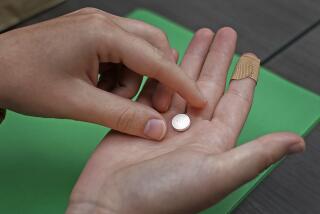Testosterone replacement products boost heart attack, stroke risk, FDA says
The Food and Drug Administration has ordered the makers of testosterone replacement products, which have been aggressively marketed to men with symptoms of low energy and libido, to bear a warning that there is a “possible increased risk of heart attack and strokes” in patients taking the medications.
The FDA’s warning also calls for the labels of testosterone products to clarify that the prescription hormone is meant for use by men whose low testosterone levels are caused by certain medical conditions, not by normal aging.
Although genetic disorders and conditions affecting the testicles, pituitary gland and brain can lead to low testosterone levels and flagging energy and sex drive, so too can aging. For this latter group, the FDA is underscoring that it has not found the benefits associated with testosterone use to justify the risks.
About 3% of American men over 40 are boosting their testosterone levels with a prescription supplement, despite mounting research evidence that rates of heart attacks and strokes are nudged upward among men taking the supplement. Driven by vigorous advertising campaigns, testosterone prescriptions grew fivefold between 2000 and 2011, netting the makers of the products $1.6 billion annually.
The FDA has “become aware that testosterone is being used extensively in attempts to relieve symptoms in men who have low testosterone for no apparent reason other than aging. The benefits and safety of this use have not been established,” said a statement released Tuesday by the agency.
The risks to those taking testosterone are not fully understood, and research returning worrisome results have had methodological problems. A 2010 clinical trial found such a sufficiently heightened risk of heart attacks and strokes among men taking testosterone that the trial was stopped. Subsequent trials, however, failed to find such risks.
A November study published in the Journal of the American Medical Assn. said that men who underwent an artery-clearing procedure and then took testosterone had a 30% greater likelihood of heart attack, stroke or death from any cause than did similar men who did not take testosterone. But those results have been challenged, and the study’s authors subsequently published clarifications that appear to have weakened their findings.
Testosterone medications have been prescribed since the 1950s to a small swath of American males with conditions that interfere with their own production of testosterone. But with televised “disease awareness” campaigns and broad marketing, drugmakers who have devised new formulations of testosterone are aiming at the 20%, 30% and 40% of men over 50, 60 and 70 years old, respectively, whose testosterone levels have dropped, due only to aging, to those defined as “hypogonadism.”
The FDA has estimated that 1.5 million men were taking a testosterone supplement in 2013, nearly double the 850,000 men who were taking it in 2010. It also noted that about a quarter of those had never been tested for hypogonadism, suggesting that a testosterone supplement had been prescribed just on the basis of symptoms, such as weight gain and low sex drive and energy, that are common as men age.
With the use of the male hormone supplement growing so fast, it’s crucial to nail down any risk it may pose.
The FDA called a meeting of independent advisors in September to review the safety data on testosterone and suggest whether the agency should require further warnings or place limitations on marketing. The FDA advisory panel voted overwhelmingly to recommend the actions the agency proposed Tuesday.
“People are looking for the fountain of youth,” said advisory panel member Dr. Aaron Katz, a urologist in Mineola, N.Y.
Interested in drug safety, drug marketing, drug trends? Me too. Follow me on Twitter @LATMelissaHealy and “like” Los Angeles Times Science & Health on Facebook.







